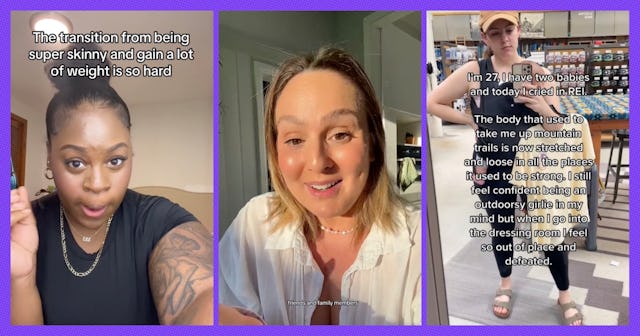Women Are Sharing Their "Body Grief" On TikTok After Going Through Physical Changes
Our bodies change throughout our lives, for so many reasons. And it’s time we talked about it openly.

You’d be hard pressed to find one single, fully grown person who hasn’t even experienced what is now known as “body grief” — that feeling of loss for a former self, a former body, and maybe a conventionally more attractive body at that.
Thousands of women are sharing their stories of body grief on TikTok, welcoming others to be more vulnerable with their body image struggles as well as working to find acceptance in the present.
What is body grief?
Body grief is that sinking feeling of distress after a physical transformation — typically from a smaller size to a larger size. Body grief could manifest, for example, as women get older, as they have children, or as they navigate trauma, career changes, or other big life events. However, body grief can extend the other way as well for people who are suddenly met with physical disabilities, an accident, or a chronic illness that changes how their body works or looks.
Women are sharing their stories of body grief in a new TikTok trend with the hashtag #bodygrief reaching nearly 880,000 views.
Aleah Elizabeth (@aleahhelizabeth) recently spoke frankly about her weight gain, which she days is due to birth control, despite being “super skinny” most of her life.
“I used to be 100 to 110 pounds for [the] majority of my life and I’ve gained close to 60, 70 pounds. I thought I was gonna be a happy girl because the boys like girls who are thick,” she said in a now-viral video with more than 2 million views.
“But as I kept gaining the weight, I literally hated my body more and more and more. I hated my body when I was skinny, and I hated my body when I was gaining weight.”
Elizabeth went on to explain that the weight gain has severe effects on her mental health.
“It really put me in a depressive state,” she admitted. “And then you gain so much weight and everybody around you notices it and talks about it, and then starts to make you feel bad about it. It is the worst thing I think I ever went through in my life. With my body, with myself, mentally and just all the insecurities.”
Okay, whoever is around this sweet girl, talking s**t about her body needs to see themselves out! Not okay!
Another content creator, Sami Rose (@sami.rose_), a counselor and body image coach based in Australia, spoke on that difficult task of, “letting go of the thin ideal” that, for so many of us, has been ingrained into our brains since preschool.
“I’d spent all of my teens and all of my 20s having this number in my head, and this body in my head, that I thought was gonna solve all of my problems,” she said.
After losing about 55 pounds and then gaining it back, the body grief became very real for her.
“I got there and I found out that that wasn’t really the case and that I still had body insecurities….So I had to really grieve the notion of what a good body meant to me,” she said.
Rose explained that when her friends, family, and followers were hyping her up for losing weight, she began to associate all her worth on the size of her jeans.
Rose explained, can make a significant difference in the way you perceive your self-worth — which she has first-hand experience with.
“I had all this adoration. When I was at my lowest weight, I had people envious of my abs and writing ‘Goals’ on my photos,” she said. “So I had to really reflect on ‘Who am I other than my body? What do I have to offer the world? What’s the mark that I want to leave on the world? What is the feeling that I want to give to people when they come across me?'”
After writing down a list of all the things she likes about herself, outside of her looks, Rose shared she had “such a new appreciation” for herself.
“I think that can be really special in just rebuilding your identity and proving to yourself that you’re more than just a body,” she added. “That your appearance is a part of you, but it’s not the most important part of you.”
If there is any group of people who know a thing or two about body grief, it’s anyone with a postpartum body. Not only are you maybe a little bit bigger than pre-baby, but your legs are swollen, your breast are engoged, your nipples are raw and your hair is falling out. It’s totally normal to look at your postpartum body in the mirror and go, “Who the f**k are you?”
That’s why this #bodygrief movement is such a great thing for women. Instead of bottling up all that sadness and insecurity and internalized B.S., women have created a safe space to share that grief. And perhaps to understand where it’s coming from and why — and then to finally move past it.